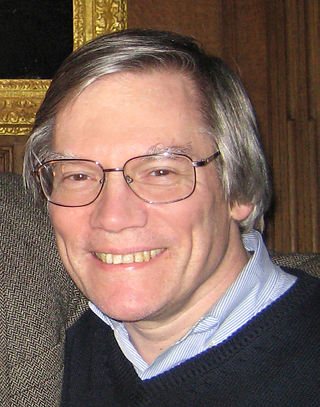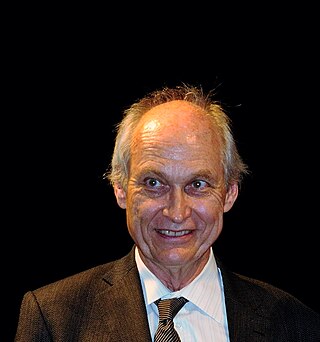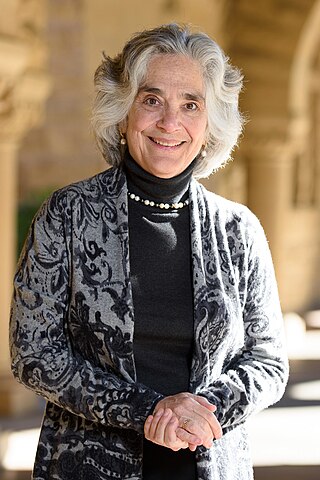
SLAC National Accelerator Laboratory, originally named the Stanford Linear Accelerator Center, is a federally funded research and development center in Menlo Park, California, United States. Founded in 1962, the laboratory is now sponsored by the United States Department of Energy and administrated by Stanford University. It is the site of the Stanford Linear Accelerator, a 3.2 kilometer (2-mile) linear accelerator constructed in 1966 that could accelerate electrons to energies of 50 GeV.

Burton Richter was an American physicist. He led the Stanford Linear Accelerator Center (SLAC) team which co-discovered the J/ψ meson in 1974, alongside the Brookhaven National Laboratory (BNL) team led by Samuel Ting for which they won Nobel Prize for Physics in 1976. This discovery was part of the November Revolution of particle physics. He was the SLAC director from 1984 to 1999.

Alan Harvey Guth is an American theoretical physicist and cosmologist who is the Victor Weisskopf Professor of Physics at the Massachusetts Institute of Technology. Along with Alexei Starobinsky and Andrei Linde, he won the 2014 Kavli Prize "for pioneering the theory of cosmic inflation." Guth's research focuses on elementary particle theory and how particle theory is applicable to the early universe.
The Kavli Institute for Theoretical Physics (KITP) is a research institute of the University of California, Santa Barbara dedicated to theoretical physics. KITP is one of 20 Kavli Institutes.

Michael S. Turner is an American theoretical cosmologist who coined the term dark energy in 1998. He is the Rauner Distinguished Service Professor Emeritus of Physics at the University of Chicago, having previously served as the Bruce V. & Diana M. Rauner Distinguished Service Professor, and as the assistant director for Mathematical and Physical Sciences for the US National Science Foundation.
Tom Abel is a German cosmologist who first simulated the collapse of a metal-free massive star that belongs to the first generation of stars in the Universe. This work was done in collaboration with Greg L. Bryan and Michael L. Norman and was published in Science magazine(2002, 295, 93). He received his Doctor of Philosophy from Ludwig Maximilian University of Munich in 2000.

Electron scattering occurs when electrons are displaced from their original trajectory. This is due to the electrostatic forces within matter interaction or, if an external magnetic field is present, the electron may be deflected by the Lorentz force. This scattering typically happens with solids such as metals, semiconductors and insulators; and is a limiting factor in integrated circuits and transistors.

Persis S. Drell is the Provost Emerita and the James and Anna Marie Spilker Professor in the Stanford University School of Engineering, a professor of materials science and engineering, and a professor of physics. Prior to her appointment as provost, she was dean of the Stanford School of Engineering from 2014 to 2017 and director of the US Department of Energy’s SLAC National Acceleratory Laboratory from 2007 to 2012.
SPEAR[a] was a collider at the SLAC National Accelerator Laboratory. It began running in 1972, colliding electrons and positrons with an energy of 3 GeV. During the 1970s, experiments at the accelerator played a key role in particle physics research, including the discovery of the
J/ψ
meson, many charmonium states, and the discovery of the tau.

Roger David Blandford, FRS, FRAS is a British theoretical astrophysicist, best known for his work on black holes.
The Kavli Foundation, based in Los Angeles, California, is a foundation that supports the advancement of science and the increase of public understanding and support for scientists and their work.

JoAnne L. Hewett is a theoretical particle physicist on the faculty of the SLAC National Accelerator Laboratory at Stanford University, where she is a professor in the Department of Particle Physics and Astrophysics. Since 2017 she has been the associate lab director of the Fundamental Physics Directorate and the chief research officer at SLAC. Her research interests include physics beyond the Standard Model, dark matter, and hidden dimensions. She is a fellow of the American Physical Society and a fellow of the American Association for the Advancement of Science (AAAS).
Risa H. Wechsler is an American cosmological physicist, Professor of Physics at Stanford University, and Professor of Particle Physics and Astrophysics at SLAC National Accelerator Laboratory. She is the director of the Kavli Institute for Particle Astrophysics and Cosmology.
Martin B. Einhorn is an American theoretical physicist.
Joshua A. Frieman is a theoretical astrophysicist who lives and works in the United States. He is a senior scientist at Fermilab and a professor of astronomy and astrophysics at the University of Chicago. Frieman is known for his work studying dark energy and cosmology, and he co-founded the Dark Energy Survey experiment. He was elected a member of the National Academy of Sciences in 2022.
Leonardo Senatore is an Italian theoretical physicist and professor at the Stanford Institute for Theoretical Physics, the Kavli Institute for Particle Astrophysics and Cosmology, and SLAC. He was recently appointed professor at ETH Zurich.
Stefan Funk is a German astroparticle physicist. He is a professor at the Erlangen Centre for Astroparticle Physics at the FAU Erlangen-Nuernberg in Germany and an elected a fellow of the American Physical Society.
Daniel S. Akerib is an American particle physicist and astrophysicist. He was elected in 2008 a fellow of the American Physical Society (APS).
Hsiao-Mei (Sherry) Cho is a solid state physicist who works as a lead scientist at the SLAC National Accelerator Laboratory in California. Her research involves the development of instruments to measure cosmological phenomena including dark matter and the polarization of the cosmic microwave background.

Gary Shiu is a Chinese-American theoretical physicist who is a professor of physics at the University of Wisconsin-Madison. His research spans cosmology, particle physics, and string theory. He has made significant contributions to both fundamental and phenomenological aspects of string theory. He is well known for his work in constructing models of particle physics and cosmology from string theory, and in elucidating experimental and observational consequences of fundamental physics. He brought string theory research to the University of Wisconsin-Madison and was involved in the founding of the Theoretical and Computational Cosmology Group and the AI ∩ Universe Initiative.









